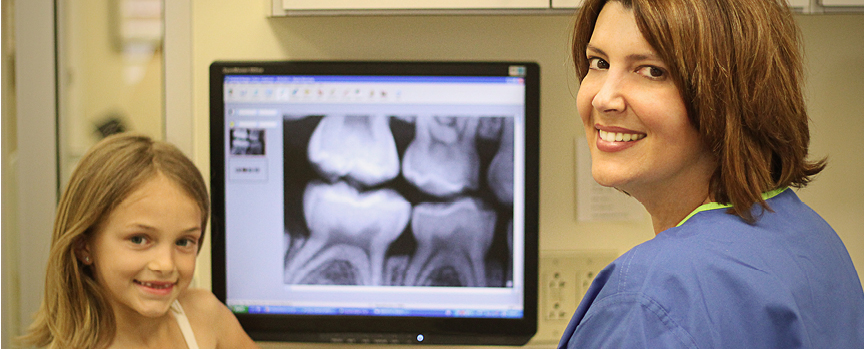After being in practice for over a decade, our doctors have had parents request that no radiographs be taken on their children, but the reasoning behind their request varies. The usual concerns expressed are fear of radiation, discomfort, and cost. Why have you objected in the past? Are there any concerns you would like to discuss?
Please allow us to explain why radiographs are so important and a necessary part of the standard of care.
A Visual Exam Without Radiographs:
- Allows examination of only 3 out of 5 exposed surfaces on each tooth (that’s 60% of each tooth)
- Keep in mind that 2/3 of each tooth lies below the gumline and into the bone so a visual exam allows above gumline ONLY.
So if 1/3 of the tooth is above the gumline and only able to see 60% of that 1/3, without radiographs we are only doing an examination of 18% of each tooth.
Radiographs are necessary to evaluate and definitively diagnose:
- Dental Decay
- Periodontal Disease
- Tumors and Cysts
- Congenitally Missing Teeth
- Foreign Bodies
- Developmental Anomalies
- Calcification of Glands and Arteries (which are life threatening conditions)
- Ectopic Eruption of Permanent Teeth (needing assistance in finding path into mouth)
- Crowding or Misalignment (taking steps to eliminate need for orthodontics or time spent in braces)
Radiation Exposure:
New Orleans Childrens Dental Center follows all the American Academy of Pediatric Dentistry guidelines to minimize patient’s exposure in regards to frequency and type of xrays recommended
Our office takes the MINIMUM number of radiographs necessary to perform exams.
We use lead aprons, thyroid collars, beam collimation and have the most advanced digital sensors on the market, requiring the least amount of exposure to obtain a diagnostic image.
On average, Americans receive a radiation dose of about 620 millirem each year.
The average dental radiographs exposes the patient to 1.5 mrem in which we take 2-4 images every 12-24 months, exposing to about 4-6 mrem per year.
We get more radiation from the foods we eat (~30-40 mrem/year) or from a roud trip flight to Frankfurt (10 mrem) than we do from dental xrays.
Legal Duty to Provide Competent Care:
Without necessary films, we compromise our ability to provide quality care.
If radiographs are not taken when needed for proper diagnosis and later a serious dental or medical condition arises, the healthcare provider is held liable.
No signed waiver or signed refusal would protect the healthcare provider in court, as no patient or parent can give consent for a dentist to be negligent.
Malpractice insurance carriers recommend not accepting patients who refuse radiographs
Malpractice insurance literature reads as follows: “Dentists should proceed with great caution when patients insist on substandard care that may lead to serious harm. Treating without xrays may lead to unreasonable results or risks, and withdrawing from care may be necessary. If a lawsuit is filed, the dentist’s professional judgement will be scrutinized.”
